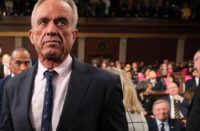The Supreme Court gave the green light on Wednesday to Virginia’s plan to remove an estimated 1,600 suspected noncitizens from its voter records, mere days before the 2024 election. The state was granted a stay on a lower court’s ruling that had put a halt to Virginia’s voter removal program, which was initiated 90 days prior to Election Day in August, in line with the National Voter Registration Act’s stipulation that states must finalize programs to purge ineligible voters from registration lists 90 days before federal elections.
Despite the Supreme Court’s ruling, Justices Sonia Sotomayor, Elena Kagan, and Ketanji Brown Jackson expressed their disagreement with Virginia officials’ request. A spokesperson from the Justice Department expressed disappointment with the Supreme Court’s order, stating that the suit was filed to ensure every eligible American citizen can vote.
Virginia’s Governor, Republican Glenn Youngkin, celebrated the decision, calling it a win for “commonsense and election fairness.” He emphasized the importance of maintaining clean voter records as part of a comprehensive approach to ensure fair elections, which also include measures such as paper ballots, signature verification, and a ‘triple check’ vote counting process.
The Supreme Court’s intervention was sought following a Justice Department lawsuit against Virginia earlier this month. The lawsuit was targeted at an executive order from Youngkin that formalized a program to remove people who failed to verify their citizenship to the Department of Motor Vehicles from statewide voter registration lists. State officials said the program has been operational for years, and the order only modified the data reporting frequency from monthly to daily.
The Justice Department countered that the implementation of the program breached the Quiet Period Provision of the National Voter Registration Act, which prevents states from enacting programs that aim to remove ineligible voters from their rolls 90 days before an election. Federal officials explained that the quiet period is intended to lower the risk of eligible voters being mistakenly removed from voter rolls through automatic removal programs, and to ensure they have sufficient time to correct any errors.
Virginia officials contended that the Quiet Period Provision does not apply to the removal of noncitizens from the state’s voter rolls, as they are not eligible to vote. However, they stated that those identified as noncitizens and registered voters are notified that their registrations will be canceled and given 14 days to confirm their citizenship.
The Justice Department maintained that Virginia’s program clearly falls within the Quiet Period Provision and argued that the district court’s order impacts only a specific group of identified voters. It does not impede Virginia officials from conducting individual investigations or taking other actions to ensure noncitizens are not voting in the general election, Solicitor General Elizabeth Prelogar wrote in a Supreme Court filing.
The Justice Department has filed a similar suit against Alabama over its procedure for removing about 3,200 potential noncitizens from its voter registration list. Prosecutors claimed that the state initiated its program 84 days before Election Day and erroneously deemed over 2,000 eligible voters ineligible to vote. A federal judge recently barred Alabama from continuing the program to remove ineligible voters from registration lists and ordered the state to restore eligibility to the deactivated voters.





